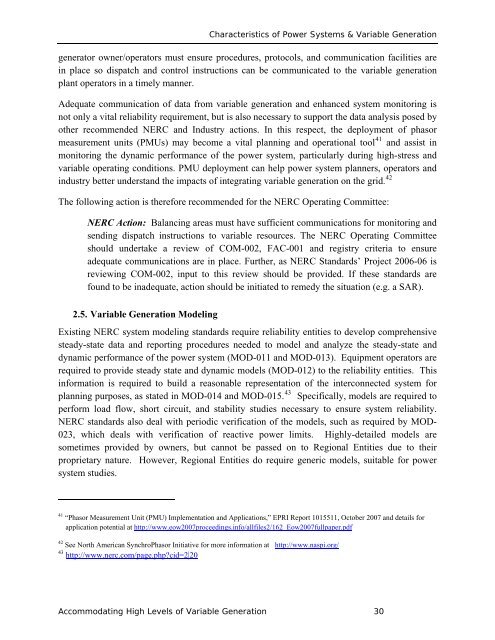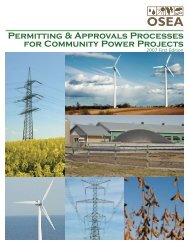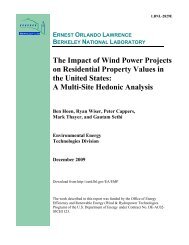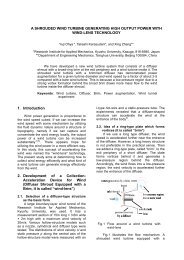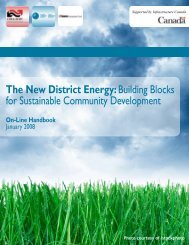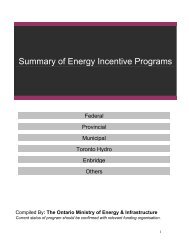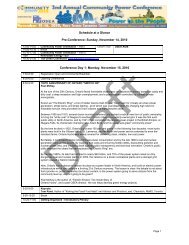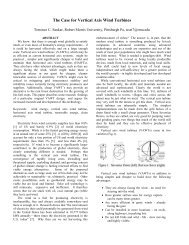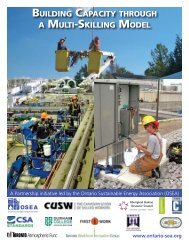Accommodating High Levels of Variable Generation - NERC
Accommodating High Levels of Variable Generation - NERC
Accommodating High Levels of Variable Generation - NERC
Create successful ePaper yourself
Turn your PDF publications into a flip-book with our unique Google optimized e-Paper software.
Characteristics <strong>of</strong> Power Systems & <strong>Variable</strong> <strong>Generation</strong><br />
generator owner/operators must ensure procedures, protocols, and communication facilities are<br />
in place so dispatch and control instructions can be communicated to the variable generation<br />
plant operators in a timely manner.<br />
Adequate communication <strong>of</strong> data from variable generation and enhanced system monitoring is<br />
not only a vital reliability requirement, but is also necessary to support the data analysis posed by<br />
other recommended <strong>NERC</strong> and Industry actions. In this respect, the deployment <strong>of</strong> phasor<br />
measurement units (PMUs) may become a vital planning and operational tool 41 and assist in<br />
monitoring the dynamic performance <strong>of</strong> the power system, particularly during high-stress and<br />
variable operating conditions. PMU deployment can help power system planners, operators and<br />
industry better understand the impacts <strong>of</strong> integrating variable generation on the grid. 42<br />
The following action is therefore recommended for the <strong>NERC</strong> Operating Committee:<br />
<strong>NERC</strong> Action: Balancing areas must have sufficient communications for monitoring and<br />
sending dispatch instructions to variable resources. The <strong>NERC</strong> Operating Committee<br />
should undertake a review <strong>of</strong> COM-002, FAC-001 and registry criteria to ensure<br />
adequate communications are in place. Further, as <strong>NERC</strong> Standards’ Project 2006-06 is<br />
reviewing COM-002, input to this review should be provided. If these standards are<br />
found to be inadequate, action should be initiated to remedy the situation (e.g. a SAR).<br />
2.5. <strong>Variable</strong> <strong>Generation</strong> Modeling<br />
Existing <strong>NERC</strong> system modeling standards require reliability entities to develop comprehensive<br />
steady-state data and reporting procedures needed to model and analyze the steady-state and<br />
dynamic performance <strong>of</strong> the power system (MOD-011 and MOD-013). Equipment operators are<br />
required to provide steady state and dynamic models (MOD-012) to the reliability entities. This<br />
information is required to build a reasonable representation <strong>of</strong> the interconnected system for<br />
planning purposes, as stated in MOD-014 and MOD-015. 43 Specifically, models are required to<br />
perform load flow, short circuit, and stability studies necessary to ensure system reliability.<br />
<strong>NERC</strong> standards also deal with periodic verification <strong>of</strong> the models, such as required by MOD-<br />
023, which deals with verification <strong>of</strong> reactive power limits. <strong>High</strong>ly-detailed models are<br />
sometimes provided by owners, but cannot be passed on to Regional Entities due to their<br />
proprietary nature. However, Regional Entities do require generic models, suitable for power<br />
system studies.<br />
41 “Phasor Measurement Unit (PMU) Implementation and Applications,” EPRI Report 1015511, October 2007 and details for<br />
application potential at http://www.eow2007proceedings.info/allfiles2/162_Eow2007fullpaper.pdf<br />
42 See North American SynchroPhasor Initiative for more information at http://www.naspi.org/<br />
43 http://www.nerc.com/page.php?cid=2|20<br />
<strong>Accommodating</strong> <strong>High</strong> <strong>Levels</strong> <strong>of</strong> <strong>Variable</strong> <strong>Generation</strong> 30


